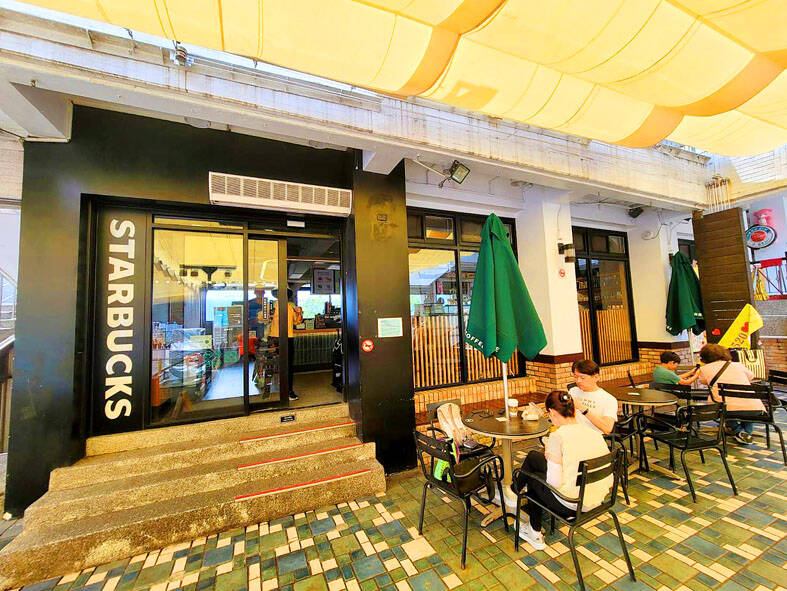The highest Starbucks in Taiwan, which is 1,743m above sea level in Nantou County, is to close on Monday, conglomerate Uni-President, the owner of Starbucks, said yesterday.
The Mist Plaza, a tourist village area in Nantou’s Cingjing Farm (清境), opened in 2003. It has the highest-elevated Starbucks and 7-Eleven in the nation.
A Taiwanese specialty coffee shop has been invited to take its place, Mist Plaza director Wang Jen-chu (王仁助) said yesterday.

Photo courtesy of Cingjing Farm
Local tourism operator Chen Wei-lin (陳維林) on Facebook wrote that the Starbucks had become a local landmark and a symbol of tourism in mountain regions.
The branch’s closure signifies a collapse in local tourism and an imbalance in national tourism policies, he said.
The Cingjing 7-Eleven and the Small Swiss Garden 7-Eleven are also no longer operating 24 hours, given low foot traffic at night, higher operating costs and broader decline in consumer spending in the Cingjing area, Chen said.
However, the Mist Plaza 7-Eleven closure was due to insufficient staffing and a sluggish domestic tourism industry, troubles shared among rural tourism areas nationwide, he said.
Cingjing remains easily accessible via frequent “Taiwan Tourist Shuttle” buses from Taichung to Puli (埔里) and hourly buses from Puli to Cingjing, Wang said.
The farm no longer raises cattle to reduce carbon emissions, Wang said.
To encourage overnight stays, the farm has launched in-depth indigenous culture tours and an outdoor starlight cinema, while the Tourism Administration regularly organizes summer stargazing events, he said.
To attract foreign tourists, Cingjing Farm is hosting a special exhibition at Taipei 101 until next month to showcase local scenic beauty, and display historical artifacts and photographs from the Seediq and Yunnan-Burma communities.
On Aug. 1, students from Ren-ai Vocational High School are to perform traditional indigenous dances at Taipei 101.
Customers are invited to visit the closest branch in Nantou’s Puli Township after the Cingjing branch’s final day of operations.

“China is preparing to invade Taiwan,” Deputy Minister of Foreign Affairs Francois Wu (吳志中) said in an exclusive interview with British media channel Sky News for a special report titled, “Is Taiwan ready for a Chinese invasion?” the Ministry of Foreign Affairs said today in a statement. The 25-minute-long special report by Helen Ann-Smith released yesterday saw Sky News travel to Penghu, Taoyuan and Taipei to discuss the possibility of a Chinese invasion and how Taiwan is preparing for an attack. The film observed emergency response drills, interviewed baseball fans at the Taipei Dome on their views of US President

ECONOMIC BENEFITS: The imports from Belize would replace those from Honduras, whose shrimp exports have dropped 67 percent since cutting ties in 2023 Maintaining ties with Taiwan has economic benefits, Ministry of Foreign Affairs officials said yesterday, citing the approval of frozen whiteleg shrimp imports from Belize by the Food and Drug Administration (FDA) as an example. The FDA on Wednesday approved the tariff-free imports from Belize after the whiteleg shrimp passed the Systematic Inspection of Imported Food, which would continue to boost mutual trade, the ministry said. Taiwan’s annual consumption of whiteleg shrimps stands at 30,000 tonnes, far exceeding domestic production, the ministry said. Taiwan used to fill the gap by importing shrimps from Honduras, but purchases slumped after Tegucigalpa severed diplomatic ties with Taiwan

The Executive Yuan yesterday approved a southwestern extension of the Sanying MRT Line from New Taipei to Bade District (八德) in Taoyuan, with a goal of starting construction by late 2026. The 4.03-kilometer extension, featuring three new stations, will run from the current terminus at Yingtao Fude Station (LB12) in New Taipei City to Dannan Station (LB14), where it will connect with Taoyuan’s Green Line, New Taipei City Metro Corp said in a statement. This extension will follow the completion of core Sanying Line, a 14.29-kilometer medium-capacity system linking Tucheng (土城), Sansia (三峽)

CARGO LOSS: About 50 containers at the stern of the ‘Ever Lunar’ cargo ship went overboard, prompting the temporary closure of the port and disrupting operations Evergreen Marine Corp, Taiwan’s largest container shipper, yesterday said that all crew members aboard the Ever Lunar (長月) were safe after dozens of containers fell overboard off the coast of Peru the previous day. The incident occurred at 9:40am on Friday as the Ever Lunar was anchored and waiting to enter the Port of Callao when it suddenly experienced severe rolling, Evergreen said in a statement. The rolling, which caused the containers to fall, might have been caused by factors including a tsunami triggered by an earthquake in Russia, poor winter sea conditions in South America or a sudden influx of waves,